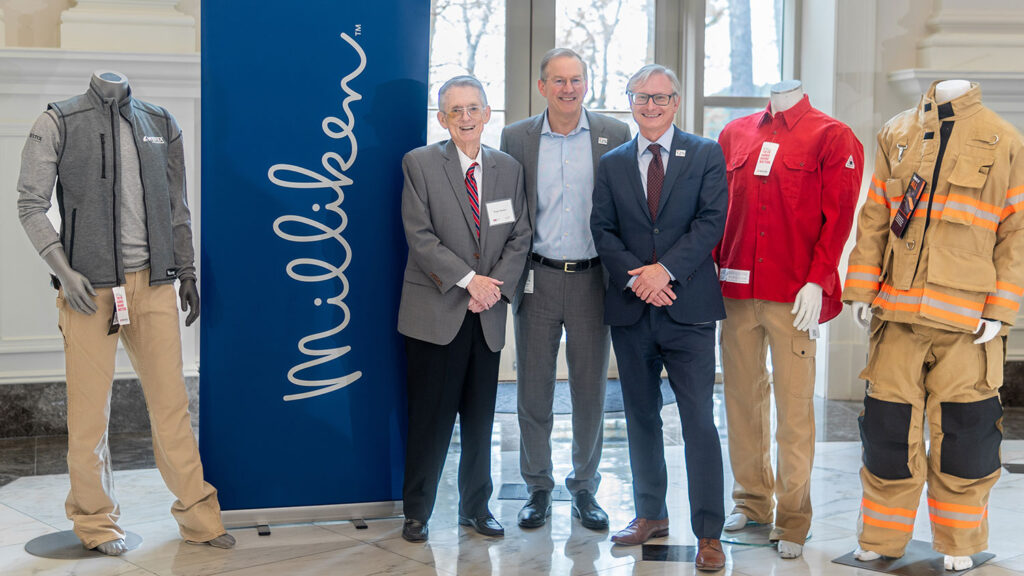Milliken Naming Investment Fuels NC State Research in the Textile Protection and Comfort Center
A $1.5 million investment from the Milliken & Company Charitable Foundation will accelerate protective and comfort research and create critical graduate fellowships in the newly named Milliken Textile Protection and Comfort Center.

When lives are on the line, textiles do more than cover. They protect, perform and push boundaries.
With a new $1.5 million investment from Milliken & Company, groundbreaking research at NC State’s Textile Protection and Comfort Center (TPACC) will be further elevated through a five-year, fixed-term naming.
Housed within the Wilson College of Textiles, the newly named Milliken & Company Charitable Foundation Textile Protection and Comfort Center is poised to reach new heights.
The center, or TPACC for short, continues to build on its global reputation for advancing innovation and enhancing comfort in high-performance protective apparel. This important work safeguards first responders, military personnel and other frontline workers who depend on protective fabrics to keep them safe, secure and able to perform in the line of duty.

“This generous investment from Milliken & Company is a powerful affirmation of our shared mission to lead in textile innovation,” says David Hinks, dean of the Wilson College of Textiles. “It will expand research in protection and performance, open doors for student discovery and fuel the next generation of breakthroughs at the Milliken Textile Protection and Comfort Center.”
It remains the only academic center in the United States that researches, tests and evaluates the comfort and protective performance of textile materials, garments and ensemble systems in one location.
“Milliken and TPACC are aligned in a bold vision to develop breakthrough materials and technologies that shape the future of protective apparel textiles,” says Halsey Cook, president and CEO at Milliken & Company and chair of the Milliken & Company Charitable Foundation. “This collaboration reflects our deep commitment to purposeful textile innovation that impacts lives, transforms industries and ensures that NC State remains a global leader in the field.”
“Milliken and TPACC are aligned in a bold vision to develop breakthrough materials and technologies that shape the future of protective apparel textiles.”
As a global manufacturing leader focusing on the science of materials, Milliken produces specialty chemicals, flooring and performance textile materials for a variety of industries, including household care, personal care, agriculture and dyes.
Reflecting its shared commitment with the Wilson College of Textiles to integrity and excellence, Milliken’s innovations are shaping the future across multiple fields. Polartec®, a Milliken & Company brand, is found in performance, lifestyle and workwear apparel brands from around the world, including household names like Adidas and Prada. Their products power everything from outdoor performance to military gear with technologies that offer cooling, insulation and fire resistance.
Milliken’s wide-ranging portfolio also includes OVIK Health, which produces the self-adhering compression bandages commonly used after donating blood, and Borchers, an industry pioneer in coating additives that can be seen in architectural and automotive applications.

Igniting discovery for over three decades
Since its establishment in 1994, TPACC has become the world’s most advanced facility for researching and testing protective materials and clothing. With over 30 years of specialized expertise, the center has made significant strides in improving the safety, performance and comfort of firefighter protective gear, as well as outdoor, sports and military apparel and accessories.
Few laboratories or institutions have had more impact on the safety and health of firefighters and first responders. The center’s unique capabilities have made TPACC an indispensable, reliable and independent resource that companies nationwide rely on to test their fire protective and performance clothing technologies using advanced testing methods.
9,500
square-foot space
The Milliken Textile Protection and Comfort Center, or TPACC for short, includes state-of-the-art laboratories, offices and collaboration spaces.
Over $75 million in awards
TPACC has generated nearly $80 million in research and technical service awards, including from the U.S. Department of Homeland Security.
Sole ISO 17025-accredited lab
The only NC State lab with ISO 17025 accreditation. This standard ensures impartial, competent testing and calibration operations.
Pioneering research isn’t the only hallmark of the center’s highly skilled and interdisciplinary team of researchers and technical personnel. Their dedication to one-of-a-kind, hands-on teaching has also equipped Wilson College of Textiles students with invaluable industry experience.
“We’re proud to serve as a bridge between groundbreaking research and real-world application,” says Burlington Distinguished Professor Roger Barker, founder and director of the Milliken Textile Protection and Comfort Center. “Through interdisciplinary innovation and educational programs, we provide high-impact collaborative services to our university, state and global partners while also training the next generation of research professionals.”
Following 9/11, Barker secured the center’s first grant from the Department of Homeland Security to develop a firefighter suit capable of protecting against fire and toxic chemical exposure. This groundbreaking research in PPE technologies has gone on to help firefighters employ best practices to minimize their exposure to harmful contaminants.
Four primary research areas — heat and flame protection, chemical protection, comfort performance, and particle protection — underscore the center’s critical impact.
Heat and Flame Protection
The center’s Thermal Protection Laboratory tests protective garments to withstand extreme heat. This directly affects people who work in dangerous, high-heat environments, such as firefighters, military personnel, molten metal workers, astronauts and racecar drivers.
Chemical Protection
The Chemical Protection and Analytical Laboratory tests gear and materials to determine how well they hold up after exposure to harmful chemicals, liquids and gases. Researchers make sure nothing dangerous seeps through or breaks down the protective layers. They also conduct evaluations of materials for contamination, cleaning efficacy and presence of hazardous substances.
Comfort Performance
The center informs textile producers whether their efforts to improve comfort — by preventing thermal discomfort, exhaustion, hyperthermia, excessive sweat and more — are successful in the research and development stage.
Particle Protection
The center develops and tests personal protective equipment to determine its ability to filter out airborne particles. The work of the Ormond Research Group, which includes critical mask performance testing, was especially vital during the COVID-19 pandemic and is now being used to address the lack of suitable respiratory protection for wildland firefighters. Additionally, the Man-in-Simulant-Test (MIST) facility, which allows researchers to test entire ensemble clothing systems in a chemical vapor simulant that represents both chemical and biological threats, is the only one of its kind in the United States located at a university.
Among the center’s most notable resources is PyroMan™, a life-sized manikin used to evaluate thermally protective clothing. Housed within a specialized 11 by 18-square foot fire chamber, PyroMan™ undergoes safe, controlled and repeated exposure to temperatures as high as 1,000 degrees Fahrenheit.
In turn, PyroMan™ shows researchers the potential tissue burn injuries that would harm a wearer, the scale of the burn area and the severity of those burns.
United to reduce exposure to PFAS for a safer tomorrow
Per- and poly-fluoroalkyl substances (PFAS) are common additives in the coatings and fabrics of first responders’ safety gear.
PFAS make products resistant to heat, oil and water, but in recent years, the protective apparel market has sought new, innovative alternatives to the use of PFAS to secure the performance characteristics that first responders need.
The Milliken Textile Protection and Comfort Center is committed to researching and finding technical textile fabric alternatives that provide the essential performance demanded by firefighters and first responders without using PFAS.




“We aim to contribute to a safe environment for firefighters and deliver innovative, new technologies for heat, oil and water resistance that do not require PFAS chemistries,” says Associate Professor Bryan Ormond ’07, ’12, who has a joint appointment in the Milliken Textile Protection and Comfort Center. “Our work, evaluating the trade-offs in the performance of PFAS and non-PFAS alternative finishes and materials, will help ensure firefighters understand the differences in the next generation of gear — its performance and limitations.”
This is all with one goal in mind, Ormond continues. “So they can continue to perform their jobs at the highest level. We owe it to the brave men and women of the fire service to ensure the gear they wear in the line of duty keeps them safe day-in and day-out.”
In 2023, Milliken became the first U.S.-based textile manufacturer to eliminate the use of PFAS in its textile fibers and finishes. In 2024, the company followed with another first: offering a non-PFAS fabric for all layers of the gear worn by firefighters.
As expected, the process was a significant undertaking, but for Milliken, it was essential to the company’s future success.
“Sustainability is a core value of our company, and we are and have always been on a quest for continuous improvement,” said Cook during Milliken’s 2022 announcement of its PFAS elimination initiative. “As part of our sustainability journey, we are committed to finding innovative and meaningful solutions to reduce our environmental impact. While we do not always begin our journey with perfect information, we strive to adjust as new information comes to light.”
New partnership champions graduate student innovation
Critical but often underfunded, graduate support is imperative to recruit the best and brightest minds to the Wilson College of Textiles. In addition to fueling groundbreaking research, Milliken’s corporate donation includes funding for new Milliken Fellowships, which will increase the stipends offered to graduate students.
“By supporting graduate research focused on developing the most advanced personal protective equipment, these fellowships will enable the TPACC to further its mission of enhancing protective clothing technology,” says Ormond, a two-time Wilson College of Textiles graduate. “The expertise of both the center and Milliken in this area will be pivotal in guiding students as they explore innovative solutions to protect firefighters from thermal threats, maintain comfort and mitigate heat stress.”
“By supporting graduate research focused on developing the most advanced personal protective equipment, these fellowships will enable the TPACC to further its mission of enhancing protective clothing technology.”
This investment will benefit the college’s future textile innovators, scientists and entrepreneurs.
“As an NC State alumnus, this gift is especially meaningful to me,” says Denny Goff, Milliken Textile division director of development for engineered performance products and a member of the Wilson College’s North Carolina Textile Foundation Board of Directors. “The Milliken & Company Charitable Foundation is dedicated to supporting purpose-driven communities, and there’s no question that the Wilson College of Textiles is shaping the future of our industry and the people within it. I’m proud to see it make a lasting impact at the university that shaped my own career and beyond.”
Milliken’s relationship with the Wilson College of Textiles began in 2009 with a gift to a restricted fund, marking the start of a longstanding commitment to supporting the college. Since then, the company’s impact has grown to include funding for scholarships, including the Centennial Scholarship Program — the college’s most prestigious award for incoming undergraduates — and the Alumni Scholarship Program. Milliken’s generosity has also provided vital unrestricted funding for the North Carolina Textile Foundation, the college’s philanthropic arm.
“This partnership represents more than a financial investment; it’s a shared belief in the power of textiles to improve lives,” Dean Hinks says. “Together, the Wilson College of Textiles and Milliken are shaping a future where innovation and curiosity come together to protect and empower people around the world.”


